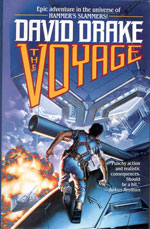 THE VOYAGE is space opera based on the Argonautica of Apollonius of Rhodes, with embellishments from other classical writers who touched on legends of Jason and the Argonauts. It’s a sequel of sorts to Cross the Stars–a minor character from the earlier novel is the hero of this one–and was a direct attempt to use the lessons I’d learned in a decade of writing to do the same sort of book, only better.
THE VOYAGE is space opera based on the Argonautica of Apollonius of Rhodes, with embellishments from other classical writers who touched on legends of Jason and the Argonauts. It’s a sequel of sorts to Cross the Stars–a minor character from the earlier novel is the hero of this one–and was a direct attempt to use the lessons I’d learned in a decade of writing to do the same sort of book, only better.
I think I did what I set out to do, but I learned some new lessons besides. The most important was that not all epics are equal.
The Odyssey, my model for Cross the Stars, was composed in the Early Iron Age, a savage time whose bones stick out through the story’s fabric in many places. I changed a number of situations in order to soften them.
On the other hand, Apollonius was head of the foremost intellectual and literary center of his time, the Library of Alexandria; he was a highly sophisticated man (and poet) by any standards. He told the story of the Argo very skillfully, but he didn’t describe (and perhaps couldn’t visualize) the brutal realities that must have underlain such a story.
I’d been thinking about the project for many years before I actually wrote The Voyage. In fact, I recall beginning to precis the Argonautica during one of my trips to Atlanta in 1983 while I was working on Window of Opportunity. I’d used the Odyssey only as a general model when I wrote Cross the Stars, but The Voyage stuck very close to Apollonius. That is, I eliminated some incidents and conflated others, but those which remain (up to the climax) are from the Argonautica and in the order Apollonius set them out.
The Argonautica stops as the Argo and her triumphant crew approach their home port. The bloodbath that followed the return was outside the taste and understanding of a literary sophisticate like Apollonius. In another, better, world I might have been able to say the same about myself; but in this one, I was drafted and sent to Southeast Asia in 1970. I was able to tell the rest of the story; and for the sake of the men I served with, I thought and think I needed to tell it.
Hiding that sort of truth makes it more likely that some later LBJ or Robert S MacNamara could send our children into a cesspool like the one those statesmen created in Viet-Nam. The Voyage is a more violent book than could’ve appealed to Apollonius, but I hope he would have appreciated the degree to which it’s homage to him. Besides, the book contains a vignette that’s both as good and as peaceful as anything I’ve written: a scene modeled on Jason’s sighting of the Cattle of the Sun on the island of Trinacria. Apollonius–and also his rival Callimachus–might well have taken pleasure in that little flash of tranquility.
—Dave Drake
The Voyage. Hammer’s Slammers Series. 1994, New York, NY: Tor. 415 p. 0312851588. $23.95.
————– 1995, New York, NY: Tor. 403 p. 0812513401 (pb). $5.99.